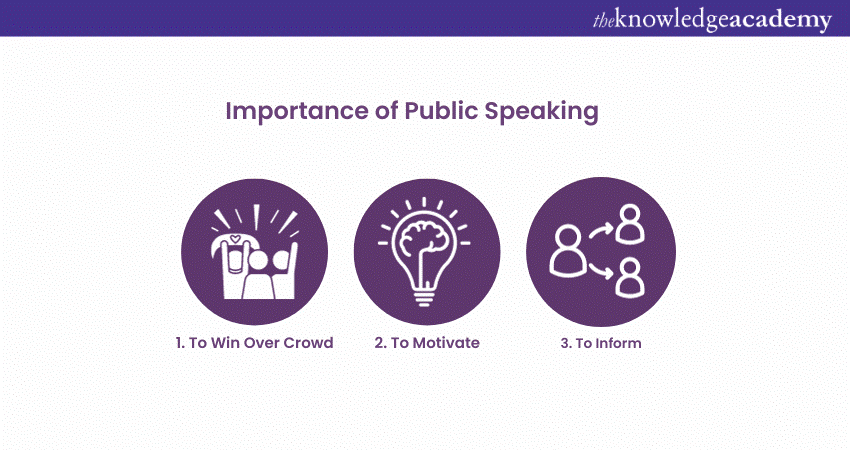We may not have the course you’re looking for. If you enquire or give us a call on 01344203999 and speak to our training experts, we may still be able to help with your training requirements.
Training Outcomes Within Your Budget!
We ensure quality, budget-alignment, and timely delivery by our expert instructors.

People who often address a large crowd for presentation or even for entertainment, must possess certain skills to make good first impression on their audience. This is where Public Speaking skills come in, and every speaker must know What is Public Speaking to make a greater impact.
Public Speaking is an art of effectively and efficiently delivering speeches or presentations to inform, persuade, or entertain an audience. It is an exceptional skill to possess because it has the power to inspire and influence others. A skilled public speaker has the ability to leave a lasting impact on the audience by delivering their message with confidence, clarity, and conviction. If you also want to make an impact, then read this blog, to learn everything about What is Public Speaking and how to set yourself apart from the crowd.
Table of Contents
1) Understanding What is Public Speaking?
2) Importance of Public Speaking
3) How to build confidence for Public Speaking?
4) Real-life examples of Public Speaking
5) Conclusion
Understanding What is Public Speaking?
Public Speaking is the act of talking to a group of people. It involves standing in front of an audience and delivering a message or sharing information to entertain or educate them. The goal is to effectively communicate and engage the listeners.
Public Speaking can take place in different settings, like meetings, presentations, or events. It requires good communication skills, clear expression, and confidence in delivering the message. The purpose can vary, such as informing, persuading, or entertaining the audience. It is a valuable skill that you can learn and practice to effectively convey your ideas and connect with others.
Importance of Public Speaking
Public Speaking is avoided by many people due to fear or shyness. However, it's a skill that shouldn't be overlooked. Throughout history, Public Speaking has played a significant role in different walks of life. It has a unique power to inform, persuade, educate, and entertain.

Improving your Public Speaking skills can benefit you in various areas of life. For instance, it boosts confidence and enhances research and deductive reasoning abilities. It allows you to effectively advocate for causes you believe in. These skills are valuable for small business owners and students alike.
Businesses can greatly benefit from Public Speaking as it helps them market their products or services. By delivering compelling speeches, they can reach potential customers and convey their messages effectively. Salespeople and executives are often expected to possess strong Public Speaking skills to represent their organisations successfully.
Learn how to improve professional relationships and productivity with our Effective Communication Skills Course – join today!
How to build confidence for Public Speaking?
Now that you know What is Public Speaking, it’s time to understand how to be an effective public speaker. Overcoming the Fear of Public Speaking can be challenging, but with some strategies and practice, it is possible. Here are some easy-to-understand tips:
Prepare and practice
The more prepared you are, the more confident you'll feel. Research your topic, organise your thoughts, and create an outline or cue cards. Practice your speech multiple times to become familiar with the content. This will boost your confidence.
Start small
Begin by speaking in front of a small and supportive audience, such as friends or family members. This will help you gain confidence gradually and you will get comfortable with speaking in front of others.
Visualise success
Imagine yourself delivering a successful speech. Visualise the positive outcome and how confident and composed you'll feel. This mental rehearsal can help alleviate anxiety and build self-assurance.
Deep breathing and relaxation techniques
Before speaking, take slow and deep breaths to calm your nerves. You should practice relaxation techniques like progressive muscle relaxation or mindfulness to reduce anxiety and promote a sense of calm.
Positive self-talk
Positive self-talk can help replace the negative thoughts with positive ones. Remind yourself that you are prepared and capable. Focus on your strengths and past successes to boost your confidence.
Engage with the audience
Shift your focus from self-consciousness to the audience. Connect with them by making eye contact, smiling, and using friendly gestures. Remember that they want you to succeed and are supportive.
Start with a strong opening
Begin your speech with a captivating opening, such as a story, quote, or interesting fact. A strong start will grab the audience's attention and help you gain momentum.
Embrace mistakes
Understand that mistakes are natural and happen to everyone, even experienced speakers. Instead of dwelling on them, learn from them and keep going. The audience is often more forgiving than we think.
Seek support and feedback
Share your speech with a trusted friend, mentor, or join a Public Speaking group. Their support and constructive feedback can help you improve and build confidence.
Real-life examples of Public Speaking
To help you understand how Public Speaking can help you in the long run, let’s look at some of these examples:
a) Political leaders, when they want to mobilise hundreds of people, present their agendas and bring the importance of the public sentiments in these agendas. This moves the public deeply, and they take up the cause as if it is going to benefit them. The speeches given by Winston Churchill and Abraham Lincoln are some of the best examples of Public Speaking.
b) Business presentations are crucial to win over investors to fund your project. If you present your ideas concisely and confidently, it will make the investors trust that not only the project but also there shall be a personal financial benefit for them in that project.
c) When teachers and professors impart important lessons verbally, this is also a form of Public Speaking. Here, it is to be noted that they teach in such a way that they can not only capture the attention of the students throughout the lesson but also the students can retain them for a longer period.
d) TED talks have been quite popular for the past few years. The speakers who preside over the meeting are excellent orators. They help the audience relate to their speech with many examples, humour, and facts. Most importantly, they maintain the pace at which they speak and change only in instances where they want to make a lasting impact on the audience. This calculated pacing during the delivery of the speech is notable, as they are not only remembered by the audience but praised even after the show ends.
e) People who preach a certain way of life or religion are also excellent public speakers. They deliver sermons, mythological facts, and other spiritual facts in their speech in such a way that the audience not only listens with rapt attention but also follows them after the speech is over. Here, you can see that these religious speakers provide guidance and inspire people, creating a community that follows those beliefs.
f) Lawyers are known to be one of the best public speakers. They present and delegate facts to win arguments over the judge and the jury members. They articulate legal facts promptly, which even the masses attending the court can understand.
g) Journalists are also one of the best public speakers. They possess the power to influence the masses by providing them with correct facts about current world affairs. With their Public Speaking skills, they can change public perception in numerous interviews.
h) Speeches by students, faculty, or guest speakers celebrate achievements, provide wisdom, and inspire other students for the next stage of their lives. These speeches are filled with real-life examples, which helps the students understand how to deal with situations in their lives.
Improve your effective communication by signing up for our Communication and Interpersonal Skills Course now!
Conclusion
We hope that this blog helped you understand What is Public Speaking. It is an important skill that allows people to share their thoughts, inform others, persuade, and entertain. While it can be intimidating, with practice and confidence-building techniques, anyone can overcome the fear and become a confident public speaker. Remember, the power of effective communication through Public Speaking can positively impact both personal and professional aspects of life.
Learn how to manage your nerves when delivering a speech or lecture with our Public Speaking Training - sign up now!
Frequently Asked Questions

Preparation and practicing delivery are essential for delivering an effective public speech. Preparation ensures that the speaker understands the topic thoroughly and can structure the speech coherently, while practicing delivery helps improve confidence, clarity, and the ability to engage and connect with the audience effectively.

Yes, Public Speaking skills can be learned through various approaches and resources. Some effective methods include attending public speaking courses or workshops, joining Toastmasters or similar speaking clubs, practicing regularly, seeking feedback, and studying speeches of accomplished speakers for inspiration and techniques.

The Knowledge Academy takes global learning to new heights, offering over 30,000 online courses across 490+ locations in 220 countries. This expansive reach ensures accessibility and convenience for learners worldwide.
Alongside our diverse Online Course Catalogue, encompassing 17 major categories, we go the extra mile by providing a plethora of free educational Online Resources like News updates, Blogs, videos, webinars, and interview questions. Tailoring learning experiences further, professionals can maximise value with customisable Course Bundles of TKA.

The Knowledge Academy’s Knowledge Pass, a prepaid voucher, adds another layer of flexibility, allowing course bookings over a 12-month period. Join us on a journey where education knows no bounds.

The Knowledge Academy offers various Leadership Courses, including Leadership Skills and Agile Leadership Trainings. These courses cater to different skill levels, providing comprehensive insights into Organisational Leadership.
Our Business Skills blogs covers a range of topics related to Public Speaking skills and upskilling, offering valuable resources, best practices, and industry insights. Whether you are a beginner or looking to advance your Leadership skills, The Knowledge Academy's diverse courses and informative blogs have you covered.
Upcoming Business Skills Resources Batches & Dates
Date
 Public Speaking Course
Public Speaking Course
Fri 28th Jun 2024
Fri 9th Aug 2024
Fri 25th Oct 2024
Fri 27th Dec 2024







 Top Rated Course
Top Rated Course



 If you wish to make any changes to your course, please
If you wish to make any changes to your course, please


